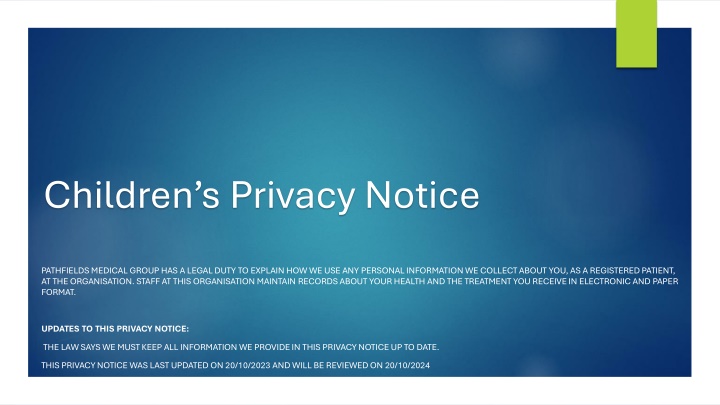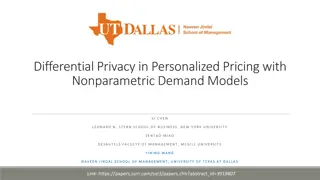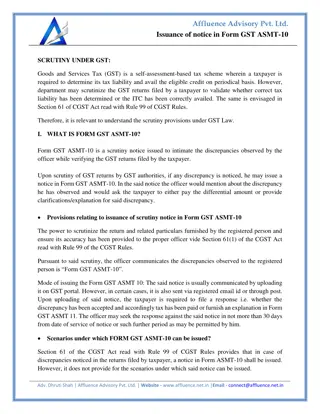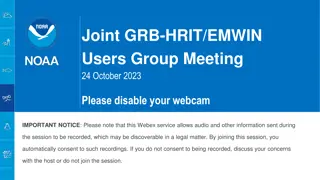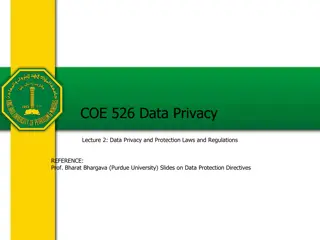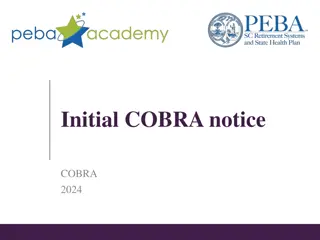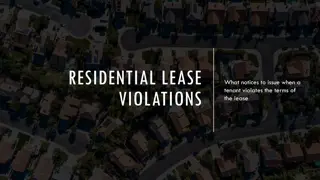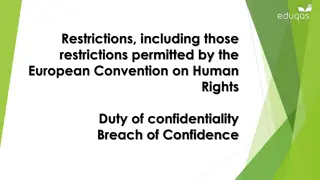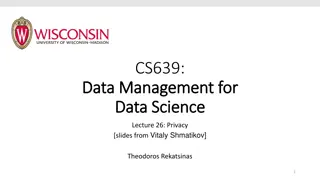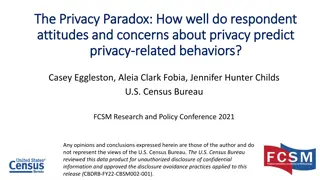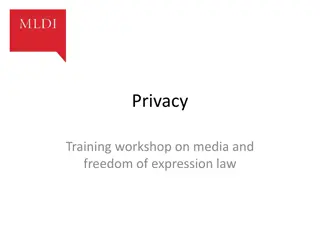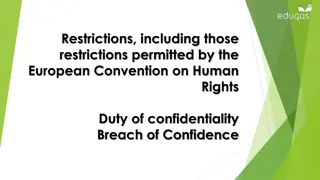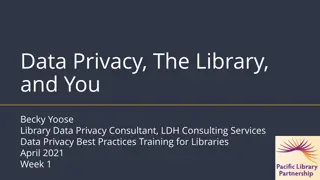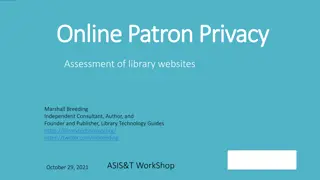Understand Children's Privacy Notice at Pathfields Medical Group
Pathfields Medical Group explains their use of personal information collected from registered patients, emphasizing the importance of privacy and adherence to the UK General Data Protection Regulation (GDPR). The notice details what information is held, how it is safeguarded, who it is shared with, patient rights, and lawful basis for data usage, ensuring compliance with data protection laws.
Download Presentation

Please find below an Image/Link to download the presentation.
The content on the website is provided AS IS for your information and personal use only. It may not be sold, licensed, or shared on other websites without obtaining consent from the author.If you encounter any issues during the download, it is possible that the publisher has removed the file from their server.
You are allowed to download the files provided on this website for personal or commercial use, subject to the condition that they are used lawfully. All files are the property of their respective owners.
The content on the website is provided AS IS for your information and personal use only. It may not be sold, licensed, or shared on other websites without obtaining consent from the author.
E N D
Presentation Transcript
Childrens Privacy Notice PATHFIELDS MEDICAL GROUP HAS A LEGAL DUTY TO EXPLAIN HOW WE USE ANY PERSONAL INFORMATION WE COLLECT ABOUT YOU, AS A REGISTERED PATIENT, AT THE ORGANISATION. STAFF AT THIS ORGANISATION MAINTAIN RECORDSABOUT YOUR HEALTH AND THE TREATMENT YOU RECEIVE IN ELECTRONIC AND PAPER FORMAT. UPDATES TO THIS PRIVACY NOTICE: THE LAW SAYS WE MUST KEEP ALL INFORMATION WE PROVIDE IN THIS PRIVACY NOTICE UP TO DATE. THIS PRIVACY NOTICE WAS LAST UPDATED ON 20/10/2023 AND WILL BE REVIEWED ON 20/10/2024
A privacy notice tells people how organisations use information that they hold about them. A new law called the UK General Data Protection Regulation 2016, also known as GDPR, says that we need to provide you with this privacy notice and let you know: What information we hold about you How we keep this especially important information safe and secure and where we keep it How we use your information Who we share your information with What your rights are When the law gives us permission to use your information WHAT IS A PRIVACY NOTICE AND WHY DOES IT APPLY TO ME?
The law gives us permission to use your information in situations where we need it to take care of you. Because information about your health is very personal, sensitive and private to you, the law is very strict about how we use it. WHY DOES THE LAW SAY YOU CAN USE MY INFORMATION? So, before we can use your information in the ways we have set out in this privacy notice, we have to have a good reason in law which is called a lawful basis . Not only do we have to do that, but we also have to show that your information falls into a special group or category because it is very sensitive. By doing this, the law makes sure we only use your information to look after you and that we do not use it for any other reason. If you would like more information about this, please ask to speak to our data protection officer (DPO) mentioned in this privacy notice who will explain this in more detail.
We, at Pathfields Medical Group, are responsible for collecting, storing and handling your information when you are registered with us as a patient. Because we do this, the law says we are the data controller. Sometimes we may use your information for a particular purpose and, when we do so, the law says we are the data processor. ABOUT US
WHAT INFORMATION DO WE HOLD ABOUT YOU? Personal information is anything that identifies you as a person and we all have personal information. Personal information that tells us something about you includes: Your name Address Mobile number Information about your parent(s) or person with parental responsibility All your health records Appointment records Treatments you have had Medicines prescribed for you and any other information to help us look after you
The law says that we must do all we can to keep your information private, safe and secure. HOW DO WE KEEP IT SAFE? We use secure computer systems, and we make sure that any written information held about you is under lock and key and kept in a safe place. This includes taking great care with any passwords we use which we change on a regular basis. We also train our staff to respect your privacy and deal with your information in a manner that makes sure it is always kept and dealt with in a safe way.
WHAT DO WE DO WITH YOUR INFORMATION? We might need to share your information with the police, courts, social services, solicitors and other people who have a right to your information, but we always make sure that they have a legal right to see it (or have a copy of it) before we provide it to them. We only usually use your information to help us care for you. That means we might need to share your information with other people who are concerned and involved with looking after your health.
WHO ELSE WILL SEE MY INFORMATION? Usually only doctors, nurses and other people who work with us are allowed to see your information. Sometimes though, if you need to go to the hospital or be seen by a special doctor, we will share your information with them, but this is only so that we can take care of you. Sometimes we might be asked to take part in medical research that might help you in the future. We will always ask you or your parent(s) or adult with parental responsibility if we can share your information if this happens. Possibly the police, social services, the courts and other organisations and people who may have a legal right to see your information.
WHAT IF I WANT TO SEE MY INFORMATION YOU HOLD ABOUT ME? We usually need to answer you within one month. Your parent(s) or adult with parental responsibility can help you with this if you need help. To ask for your information you will usually need to put your request in writing and tell us what information you want us to give you. If you want to see what information we hold about you then you have a right to see it and you can ask for it. We will give this to you free of charge. If you think there are any errors in the information, we hold about you then you can ask us to correct it, but the law says we cannot remove any of the information we hold about you even if you ask us to. This is because we need this information to take care of you. If you would like to talk to us about not sharing your information, even if this means you do not want us to share your information with your parent(s) or adult with parental responsibility, please let us know. We will be happy to help. You have a right to ask us not to share your information.
WHAT IF I WANT TO OPT OUT OF SHARING MY DATA? National opt-out facility You can choose to opt out of sharing your confidential patient information for research and planning. There may still be times when your confidential patient information is used; for example, during an epidemic where there might be a risk to you or to other people s health. You can also still consent to take part in a specific research project. Your confidential patient information will still be used for your individual care. Choosing to opt out will not affect your care and treatment. If you do not want your confidential patient information to be used for research and planning, you can choose to opt out by using one of the following methods: Online service Patients registering need to know their NHS number or their postcode as registered at their GP practice https://www.nhs.uk/your-nhs-data-matters/manage-your-choice/ NHS App For use by patients aged 13 and over (95% of surgeries are now connected to the NHS App). The app can be downloaded from the App Store or Google Play. Print and post registration form: www.pathfields.co.uk/new-patients/ Photocopies of proof of applicant s name (e.g., passport, UK driving licence etc.) and address (e.g., utility bill, payslip etc.) need to be sent with the application. It can take up to 14 days to process the form once it arrives Note: Unfortunately, the national data opt-out cannot be applied by this organisation
General practice data for planning and research opt out (GPDPR) The NHS needs data about the patients it treats to plan and deliver its services and to ensure that the care and treatment provided is safe and effective. The General Practice Data for Planning and Research data collection will help the NHS to improve health and care services for everyone by collecting patient data that can be used to do this. For example, your data can help the NHS to: Monitor the long-term safety and effectiveness of care Plan how to deliver better health and care service Prevent the spread of infectious diseases Identify new treatments and medicines through health research GP practices already share patient data for these purposes, but this new data collection will be more efficient and effective. Contributing to research projects will benefit us all as better and safer treatments are introduced more quickly and effectively without compromising your privacy and confidentiality.
Opting out of NHS Digital collecting patient data (Type 1 opt-out) If you do not want your identifiable patient data to be shared outside of your GP practice for purposes except for your own care, you can register an opt-out with your own GP practice. This is known as a Type 1 Opt-out. You can register a Type 1 Opt-out at any time and you can also change your mind at any time and withdraw a Type 1 Opt- out.
WHAT IF I HAVE A QUESTION? Should you have any questions about our privacy policy or the information we hold about you, you can: Contact the organisation via email at pathfields.practice@nhs.net. GP practices are data controllers for the data they hold about their patients Write to our data protection officer at Bex.lovewell@nhs.net
WHAT IF I HAVE A SERIOUS COMPLAINT ABOUT HOW YOU LOOK AFTER MY INFORMATION? In the unlikely event that you are unhappy with any element of our data processing methods, do please contact the Deputy Business Intelligence Manager at anyone of our surgeries in the first instance. If you feel that we have not addressed your concern appropriately, you have the right to lodge a complaint with the ICO. For further details, visit ico.gov.uk and select Raising a concern or telephone: 0303 123 1113. The Information Commissioner s Office is the regulator for the General Data Processing Regulations and offers independent advice and guidance on the law and personal data including your rights and how to access your personal information.
